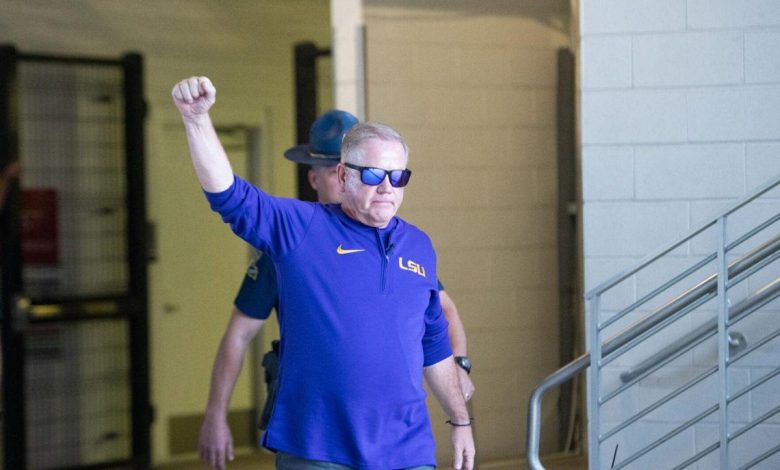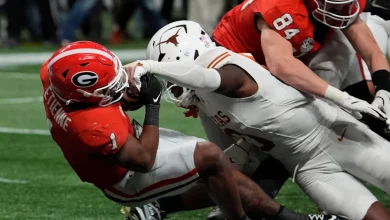There should be no involvement of the state governor in LSU football operations.

The Role of the State Governor in LSU Football Operations: Why There Should Be No Involvement
In the world of college sports, particularly college football, few institutions carry the weight and prestige of the Louisiana State University (LSU) football program. As one of the most storied and successful programs in NCAA history, LSU football has been the focal point of both state pride and national attention for decades. From legendary coaches like Nick Saban and Les Miles to Heisman-winning players such as Joe Burrow, LSU football is an institution within the state of Louisiana.
However, recent discussions and debates have arisen regarding the potential involvement of the state governor in LSU football operations. While the governor’s office plays a vital role in overseeing the state’s political and economic landscape, it is essential to emphasize that involvement in the internal workings of a sports program like LSU football could be detrimental to the university’s success. Here’s why there should be no involvement of the state governor in LSU football operations.
1. Maintaining the Integrity of College Football Programs
First and foremost, college football is an amateur sport governed by the NCAA, which has clear rules and regulations about what constitutes a legitimate, functioning program. While universities themselves are influenced by local and state governments, college football operations should remain free from political interference. Any attempt to bring in the governor’s office or state government to influence coaching decisions, player recruitment, or other aspects of football operations can undermine the integrity of the program.
The NCAA is structured to ensure that college football programs can function independently of political influence. By keeping football operations isolated from state-level politics, LSU’s program can focus on what matters most—developing student-athletes, competing at the highest level, and fostering a winning culture. The last thing LSU needs is to have decisions made based on political agendas, which could compromise the university’s ability to function as a premier educational and athletic institution.
2. The Potential for Conflicting Interests
The state governor represents all residents within Louisiana, not just those associated with LSU football or even higher education. By stepping into LSU football operations, the governor risks creating conflicting interests that could compromise decisions made for the greater good of the team and university.
For instance, the governor may have political motives that clash with the best interests of the football program. Suppose a governor feels pressured to appoint a particular head coach or recruit a specific player because of political relationships or promises made during their campaign. This could lead to decisions based on personal agendas rather than the program’s long-term success. The football program, under such circumstances, would lose the autonomy it needs to thrive in a competitive environment.
Additionally, the governor’s office is not equipped with the expertise needed to oversee day-to-day football operations. Coaching decisions, recruitment strategies, game planning, and player development require deep football knowledge and experience, which most politicians do not possess. The involvement of a state governor in such decisions could create unnecessary complications and lead to poor outcomes for the team.
3. Academic Independence and the Role of the University
LSU, like other universities across the United States, operates with a focus on both academic excellence and athletic success. The notion of the state governor influencing LSU football undermines the university’s academic independence. Universities should have the freedom to manage their athletic programs without undue political influence. Academic institutions, especially major public universities like LSU, need to maintain their autonomy in deciding how their athletic programs are run.
The state governor should be concerned with higher education policy, funding, and the broader educational landscape. While it is essential for the governor to support LSU as a major state institution, the intricacies of football operations should be left to the university’s administration and athletic department. The governor’s involvement could lead to political pressure that harms academic priorities and potentially disrupts the balance between academics and athletics.
4. Preserving Competitive Integrity
College football is a fiercely competitive sport, and LSU’s football program is no exception. For LSU to remain competitive with other programs, it must be allowed to make decisions based on its football operations. Having the governor or state government involved could invite undue political influence that could compromise the competitive integrity of the team.
Imagine if a governor had the power to push for the hiring of a particular coach due to political alliances or to secure recruits based on political interests. This would disrupt the natural, competitive recruitment process, where talent, fit, and merit should be the primary determining factors. It’s crucial that LSU is able to compete on an even playing field with schools across the country, and political interference risks altering that balance.
Moreover, college football programs are under intense scrutiny, and any signs of undue influence could harm a program’s reputation. For LSU, whose football program has a national presence, maintaining the integrity of its operations is key. The involvement of political figures like the governor would only increase the likelihood of allegations, whether warranted or not, of unfair advantages or corruption.
5. Historical Precedents and Failures of Political Involvement
The history of political interference in sports is littered with cautionary tales. From college athletics to professional leagues, politicians have occasionally overstepped their bounds, leading to negative outcomes for teams, players, and the public’s trust in the sport. In many cases, political involvement has led to corruption, inefficiency, and damaged relationships.
An example from LSU’s own history can help illustrate this point. In the early 2000s, the political landscape in Louisiana led to several clashes between state legislators and university officials over budget allocations, hiring decisions, and policy changes. While this did not directly involve football operations, the pressure from state politics impacted the broader university environment. Having such pressures interfere with football operations could have the same outcome—diverting focus away from the on-field product and toward political battles.
The NFL is another example of political interference gone wrong. In the 1960s, there were numerous attempts by state and federal lawmakers to influence team ownership, stadium construction, and labor relations. These interventions often led to chaotic situations, which resulted in a lack of focus on the game itself. The lesson here is that sports organizations function best when left to their own devices, with a clear boundary between athletics and politics.
6. LSU’s Athletic Department: Proven Success and Stability
LSU’s athletic department has proven itself time and time again as capable of overseeing a successful football program. From Nick Saban’s era to Les Miles’ national championship win, and the more recent Joe Burrow-led championship team, LSU has consistently fielded competitive teams without significant political interference. The hiring of Brian Kelly in 2022 reflects the university’s commitment to bringing in the best talent to lead the program. His background and success at Notre Dame demonstrate that LSU understands how to make wise decisions when it comes to football operations.
Kelly’s success in his first seasons with LSU has proven that the athletic department is well-equipped to handle football operations. His leadership, paired with LSU’s talent-rich recruiting base, means that there’s no need for outside interference, especially from political figures like the state governor. LSU’s football operations are capable of being managed with integrity and focus by those with the appropriate expertise—without the need for political involvement.









